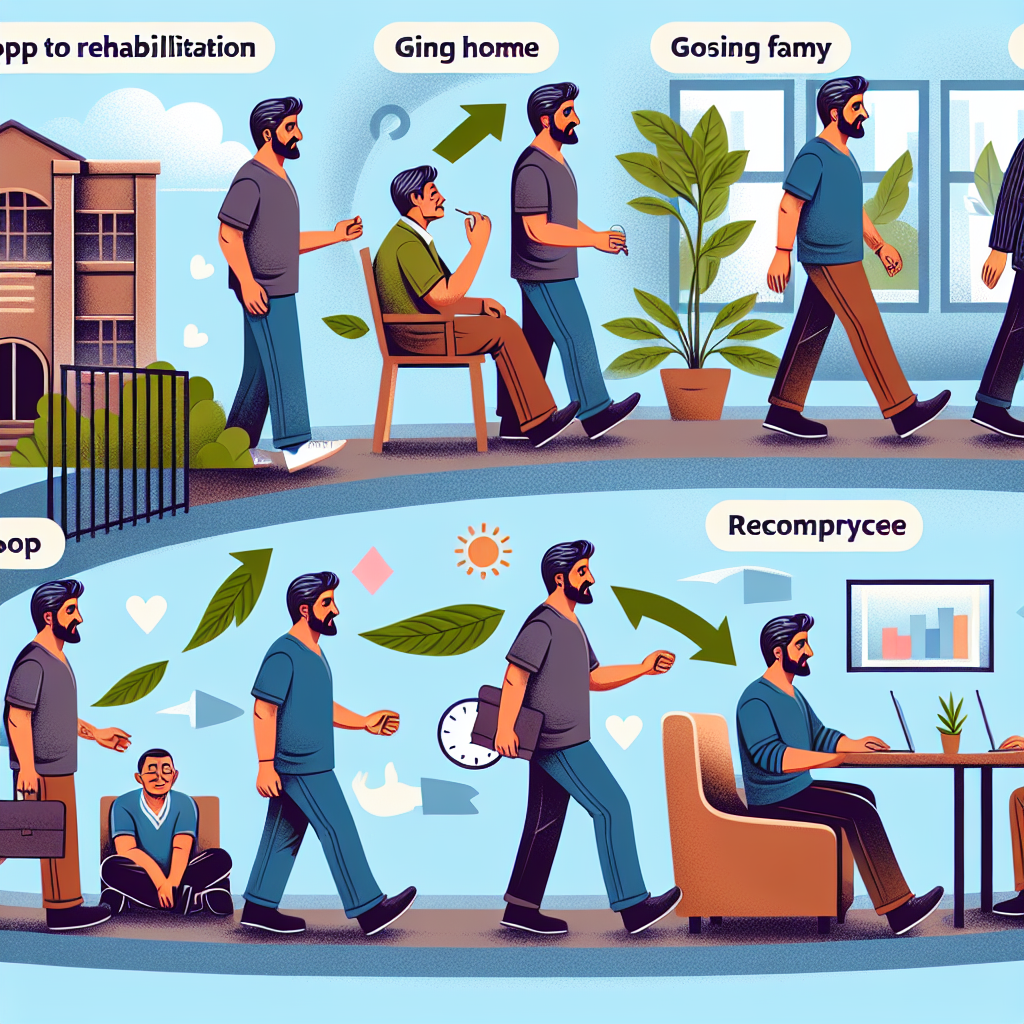-
Table of Contents
- Introduction
- Cognitive Behavioral Therapy Techniques for Fentanyl Relapse Prevention
- Building a Strong Support Network to Combat Fentanyl Relapse
- Mindfulness and Meditation Practices to Overcome Fentanyl Addiction Relapse
- The Role of Medication-Assisted Treatment in Preventing Fentanyl Relapse
- Q&A
- Conclusion
“Empower Recovery: Proven Strategies to Overcome Fentanyl Relapse”
Introduction

Relapse in fentanyl addiction is a significant challenge that requires a multifaceted approach to overcome. Effective strategies for overcoming relapse include comprehensive treatment plans that integrate medical, psychological, and social support. Medical interventions often involve the use of medications such as methadone, buprenorphine, or naltrexone to manage withdrawal symptoms and reduce cravings. Psychological support through cognitive-behavioral therapy (CBT), contingency management, and motivational interviewing helps individuals develop coping mechanisms and address underlying issues contributing to addiction. Social support systems, including peer support groups and family therapy, provide essential emotional and practical assistance. Additionally, lifestyle changes such as regular exercise, healthy eating, and stress management techniques play a crucial role in maintaining long-term recovery. By combining these strategies, individuals struggling with fentanyl addiction can build a robust foundation for sustained sobriety and improved quality of life.
Cognitive Behavioral Therapy Techniques for Fentanyl Relapse Prevention
Cognitive Behavioral Therapy (CBT) has emerged as a powerful tool in the fight against fentanyl addiction, offering individuals a structured approach to understanding and overcoming their triggers. One of the core principles of CBT is the identification and modification of negative thought patterns that contribute to addictive behaviors. By recognizing these patterns, individuals can begin to challenge and change them, paving the way for healthier coping mechanisms. This process often starts with self-monitoring, where individuals keep a detailed record of their thoughts, feelings, and behaviors related to drug use. Through this practice, they can identify specific triggers and develop strategies to manage them effectively.
Another crucial aspect of CBT is the development of problem-solving skills. Fentanyl addiction often stems from an inability to cope with life’s challenges in a healthy manner. CBT equips individuals with the tools to address these challenges head-on, rather than resorting to substance use. For instance, individuals learn to break down overwhelming problems into manageable steps, making it easier to find practical solutions. This approach not only reduces the immediate urge to use fentanyl but also builds long-term resilience.
In addition to problem-solving, CBT emphasizes the importance of building a strong support network. Social connections play a vital role in recovery, providing emotional support and accountability. Therapists often encourage individuals to engage in group therapy sessions, where they can share their experiences and learn from others who are facing similar struggles. These interactions foster a sense of community and belonging, which can be incredibly motivating during the recovery process.
Moreover, CBT teaches individuals to develop healthier coping strategies to deal with stress and negative emotions. Techniques such as deep breathing, progressive muscle relaxation, and mindfulness meditation are often incorporated into therapy sessions. These practices help individuals manage their stress levels and reduce the likelihood of relapse. By learning to stay present and focused, individuals can better navigate the emotional ups and downs that often accompany recovery.
Another key component of CBT is the concept of cognitive restructuring. This involves challenging and changing distorted beliefs and attitudes that contribute to addictive behaviors. For example, an individual might believe that they are powerless to overcome their addiction or that they are unworthy of a better life. Through cognitive restructuring, they learn to replace these negative beliefs with more positive and realistic ones. This shift in mindset can be incredibly empowering, giving individuals the confidence to pursue a life free from fentanyl.
Furthermore, CBT often includes the development of a relapse prevention plan. This plan outlines specific strategies for dealing with high-risk situations and cravings. It might include steps such as avoiding certain people or places associated with drug use, engaging in healthy activities, and seeking support from a trusted friend or therapist. Having a concrete plan in place can provide a sense of control and preparedness, reducing the likelihood of relapse.
In conclusion, Cognitive Behavioral Therapy offers a comprehensive approach to overcoming fentanyl addiction. By addressing the underlying thought patterns and behaviors that contribute to substance use, individuals can develop healthier coping mechanisms and build a strong foundation for long-term recovery. Through self-monitoring, problem-solving, social support, stress management, cognitive restructuring, and relapse prevention planning, CBT provides individuals with the tools they need to navigate the challenges of recovery and achieve lasting change. With dedication and the right support, it is possible to overcome the grip of fentanyl addiction and reclaim a healthier, more fulfilling life.
Building a Strong Support Network to Combat Fentanyl Relapse
Overcoming relapse in fentanyl addiction is a formidable challenge, but building a strong support network can be a crucial element in maintaining long-term sobriety. The journey to recovery is often fraught with obstacles, and having a reliable support system can provide the necessary encouragement and accountability to navigate these difficulties. By fostering connections with family, friends, and support groups, individuals can create a safety net that helps them stay on track.
One of the first steps in building a strong support network is to communicate openly with loved ones about the struggles and triumphs of addiction recovery. Transparency can foster understanding and empathy, which are essential for creating a supportive environment. Family members and close friends who are aware of the challenges faced by someone recovering from fentanyl addiction can offer emotional support, practical assistance, and motivation during difficult times. This open line of communication can also help in identifying potential triggers and developing strategies to avoid them.
In addition to family and friends, joining support groups can be incredibly beneficial. Groups such as Narcotics Anonymous (NA) provide a platform for individuals to share their experiences, challenges, and successes with others who are on a similar journey. These groups offer a sense of community and belonging, which can be particularly comforting for those who feel isolated in their struggle. The shared experiences within these groups can also provide valuable insights and coping strategies that might not be available through other means.
Professional counseling and therapy are also vital components of a robust support network. Therapists who specialize in addiction recovery can offer personalized guidance and support tailored to an individual’s specific needs. Cognitive-behavioral therapy (CBT), for example, can help individuals identify and change negative thought patterns that contribute to relapse. Additionally, therapists can work with clients to develop coping mechanisms and stress management techniques that are essential for maintaining sobriety.
Another important aspect of building a strong support network is engaging in activities that promote physical and mental well-being. Exercise, meditation, and hobbies can provide healthy outlets for stress and anxiety, reducing the likelihood of turning to substances as a coping mechanism. Encouraging loved ones to participate in these activities can also strengthen bonds and create positive shared experiences that reinforce the commitment to sobriety.
Moreover, it is crucial to set realistic goals and celebrate small victories along the way. Recovery is a long-term process, and acknowledging progress, no matter how minor, can boost morale and motivation. Support networks can play a significant role in this by offering praise and encouragement, which can help individuals stay focused on their recovery goals.
It is also important to recognize that setbacks are a natural part of the recovery process. Rather than viewing relapse as a failure, it should be seen as an opportunity to learn and grow. Support networks can help individuals analyze the circumstances that led to a relapse and develop strategies to prevent it from happening again. This approach fosters resilience and a proactive mindset, which are essential for long-term recovery.
In conclusion, building a strong support network is a vital strategy for overcoming relapse in fentanyl addiction. By fostering open communication with loved ones, participating in support groups, seeking professional counseling, engaging in healthy activities, setting realistic goals, and learning from setbacks, individuals can create a robust safety net that supports their journey to sobriety. With the right support, the path to recovery becomes more navigable, and the possibility of a fulfilling, drug-free life becomes increasingly attainable.
Mindfulness and Meditation Practices to Overcome Fentanyl Addiction Relapse
Overcoming relapse in fentanyl addiction is a formidable challenge, but incorporating mindfulness and meditation practices can be a powerful strategy in this journey. These practices offer a holistic approach to recovery, addressing both the mental and emotional aspects of addiction. By fostering a deeper connection with oneself, individuals can develop the resilience needed to navigate the complexities of relapse and maintain long-term sobriety.
Mindfulness, at its core, is the practice of being fully present in the moment, aware of one’s thoughts, feelings, and surroundings without judgment. This heightened state of awareness can be particularly beneficial for those recovering from fentanyl addiction, as it helps individuals recognize and manage triggers before they lead to relapse. For instance, when a person becomes mindful of their cravings, they can observe these urges without immediately acting on them. This pause creates a space for making conscious choices rather than succumbing to automatic, often destructive, behaviors.
Meditation, a key component of mindfulness, involves focused attention and deep breathing exercises that promote relaxation and mental clarity. Regular meditation practice can significantly reduce stress and anxiety, common relapse triggers for those recovering from addiction. By cultivating a sense of inner peace and stability, individuals are better equipped to handle the emotional turbulence that often accompanies the recovery process. Moreover, meditation can enhance self-awareness, allowing individuals to understand the underlying causes of their addiction and address them more effectively.
In addition to reducing stress, mindfulness and meditation can improve emotional regulation. Addiction often stems from an inability to cope with negative emotions, leading individuals to seek solace in substances like fentanyl. Through mindfulness practices, individuals learn to sit with their emotions, acknowledging them without being overwhelmed. This acceptance fosters emotional resilience, enabling individuals to face life’s challenges without resorting to substance use. Over time, this practice can transform one’s relationship with their emotions, reducing the likelihood of relapse.
Furthermore, mindfulness and meditation can strengthen the mind-body connection, which is crucial for holistic recovery. Addiction often creates a disconnect between the mind and body, leading to neglect of physical health. Mindfulness practices encourage individuals to tune into their bodies, recognizing signs of stress or discomfort that may precede a relapse. By paying attention to these signals, individuals can take proactive steps to care for their physical well-being, such as engaging in regular exercise, eating a balanced diet, and getting adequate rest. This integrated approach supports overall health and reinforces the commitment to sobriety.
Another significant benefit of mindfulness and meditation is the development of a compassionate mindset. Addiction can be accompanied by feelings of guilt, shame, and self-criticism, which can hinder the recovery process. Mindfulness encourages self-compassion, allowing individuals to treat themselves with kindness and understanding. This shift in perspective can alleviate the burden of negative self-judgment, fostering a more positive and supportive internal dialogue. As individuals learn to forgive themselves and embrace their imperfections, they build a stronger foundation for lasting recovery.
In conclusion, mindfulness and meditation practices offer invaluable tools for overcoming relapse in fentanyl addiction. By promoting self-awareness, emotional regulation, and a compassionate mindset, these practices empower individuals to navigate the challenges of recovery with greater resilience and clarity. As individuals cultivate a deeper connection with themselves, they can break free from the cycle of addiction and embrace a healthier, more fulfilling life. Through consistent practice and dedication, mindfulness and meditation can become cornerstones of a sustainable recovery journey, providing hope and inspiration for those seeking to overcome fentanyl addiction.
The Role of Medication-Assisted Treatment in Preventing Fentanyl Relapse
Medication-Assisted Treatment (MAT) has emerged as a beacon of hope for individuals grappling with fentanyl addiction, offering a structured pathway to recovery and significantly reducing the risk of relapse. Fentanyl, a potent synthetic opioid, has a high potential for addiction and overdose, making the journey to sobriety particularly challenging. However, with the integration of MAT, individuals can find a more manageable and sustainable route to overcoming their addiction.
MAT combines the use of FDA-approved medications with counseling and behavioral therapies, addressing both the physical and psychological aspects of addiction. This holistic approach is crucial because fentanyl addiction often involves complex changes in brain chemistry that make it difficult for individuals to quit using the drug on their own. By stabilizing brain function and reducing cravings, MAT medications such as methadone, buprenorphine, and naltrexone can help individuals focus on their recovery without the constant battle against withdrawal symptoms.
Methadone, a long-acting opioid agonist, works by binding to the same receptors in the brain as fentanyl, but without producing the same euphoric high. This helps to alleviate withdrawal symptoms and reduce cravings, allowing individuals to engage more fully in their recovery process. Buprenorphine, a partial opioid agonist, offers similar benefits but with a lower risk of misuse and overdose. It provides a ceiling effect, meaning that beyond a certain dose, its effects plateau, which can further enhance its safety profile. Naltrexone, an opioid antagonist, works differently by blocking the effects of opioids altogether, making it an effective option for individuals who have already detoxified from opioids and are committed to maintaining their sobriety.
In addition to the pharmacological benefits, MAT also incorporates counseling and behavioral therapies, which are essential for addressing the underlying psychological and social factors that contribute to addiction. These therapies can help individuals develop coping strategies, build a support network, and address any co-occurring mental health disorders. By providing a comprehensive treatment plan, MAT can empower individuals to take control of their recovery and build a foundation for long-term sobriety.
Moreover, the role of MAT in preventing relapse extends beyond the individual to the broader community. By reducing the incidence of relapse, MAT can help to decrease the overall burden of fentanyl addiction on healthcare systems, law enforcement, and social services. This, in turn, can create a more supportive environment for individuals in recovery, as communities become more equipped to address the challenges of addiction and provide the necessary resources for sustained recovery.
It is important to recognize that MAT is not a one-size-fits-all solution. Each individual’s journey to recovery is unique, and the choice of medication and therapeutic approach should be tailored to their specific needs and circumstances. Healthcare providers play a critical role in this process, working closely with individuals to develop personalized treatment plans that maximize the chances of success.
In conclusion, Medication-Assisted Treatment offers a powerful strategy for overcoming relapse in fentanyl addiction. By combining the stabilizing effects of medications with the transformative potential of counseling and behavioral therapies, MAT provides a comprehensive approach to recovery. For individuals struggling with fentanyl addiction, MAT can be a lifeline, offering hope, stability, and a path to a healthier, drug-free future. Through continued support and personalized care, those affected by fentanyl addiction can find the strength to overcome their challenges and reclaim their lives.
Q&A
1. **Question:** What role does cognitive-behavioral therapy (CBT) play in preventing relapse in fentanyl addiction?
**Answer:** Cognitive-behavioral therapy (CBT) helps individuals identify and change negative thought patterns and behaviors that contribute to their addiction, thereby reducing the risk of relapse.
2. **Question:** How can medication-assisted treatment (MAT) aid in overcoming relapse in fentanyl addiction?
**Answer:** Medication-assisted treatment (MAT) uses medications like buprenorphine or methadone to reduce cravings and withdrawal symptoms, making it easier for individuals to maintain sobriety and avoid relapse.
3. **Question:** Why is a strong support network important for preventing relapse in fentanyl addiction?
**Answer:** A strong support network provides emotional support, accountability, and encouragement, which are crucial for maintaining motivation and resilience in the face of triggers and stressors that could lead to relapse.
4. **Question:** What is the significance of developing coping strategies in relapse prevention for fentanyl addiction?
**Answer:** Developing coping strategies helps individuals manage stress, avoid triggers, and deal with cravings in a healthy way, thereby reducing the likelihood of relapse.
Conclusion
Strategies for overcoming relapse in fentanyl addiction include comprehensive treatment plans that integrate medical, psychological, and social support. Medications such as methadone, buprenorphine, and naltrexone can help manage withdrawal symptoms and reduce cravings. Behavioral therapies, including cognitive-behavioral therapy (CBT) and contingency management, address underlying psychological issues and promote healthier coping mechanisms. Support groups and peer support provide a sense of community and shared experience, which can be crucial for long-term recovery. Additionally, creating a stable and supportive environment, avoiding triggers, and developing a structured daily routine are essential components. Continuous monitoring and follow-up care ensure that individuals remain engaged in their recovery process and can address any emerging challenges promptly. Overall, a multifaceted approach that combines medical treatment, psychological support, and social reinforcement is most effective in preventing relapse and promoting sustained recovery from fentanyl addiction.



